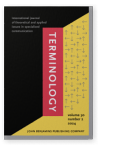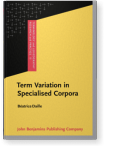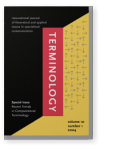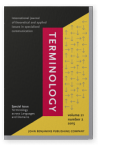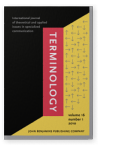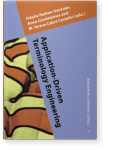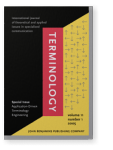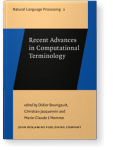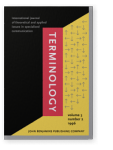Béatrice Daille
List of John Benjamins publications for which Béatrice Daille plays a role.
Journal
Titles
Term Variation in Specialised Corpora: Characterisation, automatic discovery and applications
Béatrice Daille
[Terminology and Lexicography Research and Practice, 19] 2017. xii, 272 pp.
Subjects Lexicography | Terminology
Recent Trends in Computational Terminology
Edited by Béatrice Daille, Kyo Kageura, Hiroshi Nakagawa and Lee-Feng Chien
Special issue of Terminology 10:1 (2004) vi, 182 pp.
Subjects Lexicography | Terminology
2024 Exploring terminological relations between multi-word terms in distributional semantic models Terminology 30:2, pp. 159–189 | Article
A term is a lexical unit with specialized meaning in a particular domain. Terms may be simple (STs) or multi-word (MWTs). The organization of terms gives a representation of the structure of domain knowledge, which is based on the relationships between the concepts of the domain. However,… read more
2015 Compositional translation of single-word complex terms using multilingual splitting Terminology across Languages and Domains, Drouin, Patrick, Natalia Grabar, Thierry Hamon and Kyo Kageura (eds.), pp. 263–291 | Article
Multilingual terminology acquisition from comparable corpora has been attracting the interest of researchers for twenty years, but challenges still remain. Bilingual term alignment, a subtask of multilingual terminology acquisition, requires a pre-processing step, because term structure may differ… read more
2010 Multilingual modalities for specialized languages Terminology 16:1, pp. 51–76 | Article
With the growth of textual data, techniques are necessary for their selection and organization. The organization of textual documents belonging to specialized languages relies mainly on information reflecting the subject domain, the genre of the document and its communication level. This paper… read more
2007 Variations and application-oriented terminology engineering Application-Driven Terminology Engineering, Ibekwe-SanJuan, Fidelia, Anne Condamines and Teresa Cabré (eds.), pp. 163–177 | Article
Terminology variation in texts is now a well-known phenomenon, whose amount is estimated to be between 15% to 35%, depending on the domain, text type and kind of variants identified. In this paper, we present different typologies of variants elaborated for application-oriented terminology… read more
2005 Variations and application-oriented terminology engineering Application-Driven Terminology Engineering, Ibekwe-SanJuan, Fidelia, Anne Condamines and Teresa Cabré (eds.), pp. 181–197 | Article
Terminology variation in texts is now a well-known phenomenon, whose amount is estimated to be between 15% to 35%, depending on the domain, text type and kind of variants identified. In this paper, we present different typologies of variants elaborated for application-oriented terminology… read more
2004 Introduction: Recent trends in computational terminology Recent Trends in Computational Terminology, Daille, Béatrice, Kyo Kageura, Hiroshi Nakagawa and Lee-Feng Chien (eds.), pp. 1–21 | Article
2001 Qualitative terminology extraction: Identifying relational adjectives Recent Advances in Computational Terminology, Bourigault, Didier, Christian Jacquemin and Marie-Claude L'Homme (eds.), pp. 149–166 | Chapter
This paper presents the identification in corpora of relational adjectives in French, phenomena considered by linguists as highly informative. The approach uses a termer which is applied on a tagged and lemmatized corpus. Relational adjectives and compound nouns which include a relational adjective… read more
1996 Empirical observation of term variations and principles for their description Terminology 3:2, pp. 197–257 | Article
Terms are often supposed not to be prone to variation. Empirical observation of terms in various corpora (telecommunication, physics, medicine) shows, on the contrary, the quantitative and qualitative importance of term variation. We give a precise linguistic description of the rules relating to… read more
